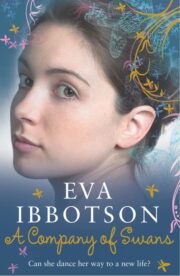A Company of Swans
by
Eva Ibbotson
For Patricia Veryan
The Author
Eva Ibbotson was born in Vienna, but when the Nazis came to power her family fed to England and she was sent to boarding school. She planned to become a physiologist, but hated doing experiments on animals, and was rescued from some fierce rabbits by her husband-to-be. She became a writer while bringing up her four children, and her bestselling novels for both adults and children have been published around the world. Her books have also won and been shortlisted for many prizes. Journey to the River Sea won the Nestlé Gold Award and was runner-up for the Whitbread Children’s Book of the Year and the Guardian Fiction Award. The Star of Kazan won the Nestlé Silver Award and was shortlisted for the Carnegie Medal. Eva lives in Newcastle.
Also by Eva Ibbotson
The Morning Gift
The Secret Countess
A Song for Summer
The Star of Kazan
Journey to the River Sea
The Dragonfly Pool
The Beasts of Clawstone Castle
The Great Ghost Rescue
Which Witch?
The Haunting of Hiram
Not Just a Witch
The Secret of Platform 13
Dial a Ghost
Monster Mission
1
There was no lovelier view in England, Harriet knew this. To her right, the soaring towers of King’s College Chapel and the immaculate lawns sloping down to the river’s edge; to her left, the blue and gold of the scillas and daffodils splashed in rich abundance between the trees of the Fellows’ Gardens. Yet as she leaned over the stone parapet of the bridge on which she stood, her face was pensive and her feet — and this was unusual in the daughter of a professor of classics in the year 1912 — were folded in the fifth position.
She was a thin girl, brown-haired and brown-eyed, whose gravity and gentleness could not always conceal her questing spirit and eagerness for life. Sensibly dressed in a blue caped coat and tam o’shanter bought to last, a leather music case propped against the wall beside her, she was a familiar figure to the passers-by: to ancient Dr Ferguson, tottering across the willow-fringed bridge in inner pursuit of an errant Indo-Germanic verb; to a gardener trimming the edges of the grass, who raised his cap to her. Professor Morton’s clever daughter; Miss Morton’s biddable niece.
To grow up in Cambridge was to be fortunate indeed. To be able to look at this marvellous city each day was a blessing of which one should never tire. Harriet, crumbling bread into the water for the world’s most blasé ducks, had told herself this again and again. But it is not cities which make the destinies of eighteen-year-old girls, it is people — and as she gazed at the lazy, muddy river and thought of her future and her home, her eyes held an expression which would have better become a little gutter starveling — a bleak and shipwrecked look devoid of happiness and hope.
Professor Morton was already in his forties when, at a reading party in Switzerland, he met an English girl working as a governess to the children of a Swiss industrialist living in an ochre-coloured castle across the lake.
Sophie Brent was enchanting, with big brown eyes, soft dark-gold hair and a beguiling chuckle. She was an orphan, poor and unprotected as only a governess can be and deeply impressed by the attentions of the serious, stern Professor with his firm opinions and cultured voice.
They married and returned to the tall, grey house in Cambridge, where the Professor’s elder sister, Louisa — a gaunt and iron-haired spinster who kept house for him — welcomed with outer resignation and inner chagrin the foolish, useless girl who had ensnared her brother.
Number 37 Scroope Terrace, off the Trumpington Road, was a house where ‘Waste Not Want Not’ was the motto. Louisa Morton counted the fish-knives on Thursdays and the silver plate on Saturdays and kept in her bedroom a box labelled ‘String too short to tie’. Though the Professor had a substantial private income in addition to his salary, she had been heard to upbraid the cook for the unbridled expenditure of three farthings on an ounce of parsley. Invitations to dine with the Mortons were among the most dreaded events in the University calendar.
In this cold, dark house filled with the smell of boiled fish and the sniffs of depressed housemaids, the Professor’s pretty young wife wilted and drooped. Sophie saw little of her husband, for the Professor wined, dined and had his being in the comfort of his College, returning to Scroope Terrace only to sleep. Though presumably acquainted with bright-eyed Nausicaa laughing with her maidens on an Aegean shore, with marvellous Sappho and her ‘love-loosened limbs’ — and indeed with all those gallant girls who had welcomed Jupiter in the guise of Swan or Bull or Shower of Gold — the Merlin Professor of Classical Studies was a dry and narrow-minded pedant. His published work consisted mainly of splenetic articles in which he vilified those who dared to disagree with his view that Odes VI and VII in the epinikia of Bacchylides had been incorrectly separated, and his lectures (from which all women were rigorously excluded) were confidently regarded as being not only the most boring in the University, but the most boring in the world.


"A Company of Swans" отзывы
Отзывы читателей о книге "A Company of Swans". Читайте комментарии и мнения людей о произведении.
Понравилась книга? Поделитесь впечатлениями - оставьте Ваш отзыв и расскажите о книге "A Company of Swans" друзьям в соцсетях.